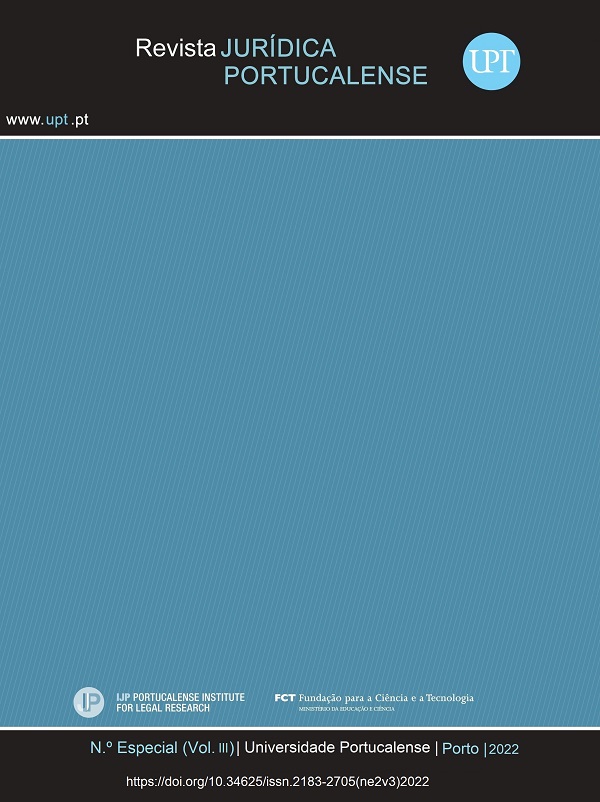The virtual platforms of the social economy and the collaborative economy: one more possibility of access to housing and development of SDGs 8, 11 and 12 intimes of COVID-19
Keywords:
digital platforms; SDGs; collaborative economy; COVID-19.Abstract
In times of COVID-19, where it is more difficult to envision a stable and sustainable society, the possibility of creating, using and promoting virtual platforms that fulfill their tasks under the spectrum of the social economy in parallel with collaborative economy platforms that meet market economy criteria is increasingly tangible. The foregoing implies that digital platforms can have objectives that transcend the profit motive and can develop their activities taking into account social values that would be summarized in the general interest. Specifically, and related to the Sustainable Development Goals (SDG), we consider that the use of digital platforms in some cases can help meet some SDGs: Ensure sustainable consumption and production patterns (12 SDGs); promote sustained, inclusive and sustainable economic growth, employment and decent work for all (8 SDGs) and Make cities inclusive, safe, resilient and sustainable (11 SDGs).
References
ÁLVAREZ CUESTA, H., “La lucha contra los “falsos autónomos” en la prestación de servicios vía app. el caso “Deliveroo”: comentario a la SJS núm. 6 valencia, de 1 de junio de 2018”, IUSLabor, núm. 8, 2018.
COHEN, M., SUNDARARAJAN, A., “Self-Regulation and Innovation in the Peer-to-Peer Sharing Economy”, University of Chicago Law Review Dialogue, núm. 82, 2015-2016, p.116.
FERNÁNDEZ LIESA, C.R., DÍAZ BARRADO, C.M., ODS 8. El trabajo decente y las aportaciones de la comunidad internacional, Madrid, 1ª ed., Instituto de Estudios Internacionales y Europeos Francisco de Vitoria, 2020, p. 115.
GIL, J., SEQUERA, J. “Expansión de la ciudad turística y nuevas resistencias. El caso de Airbnb en Madrid” EMPIRIA. Revista de Metodología de Ciencias Sociales, núm. 41, 2018, pp. 15-16
GUTZON LARSEN, H., “Three phases of Danish cohousing: tenure and the development of an alternative housing form, Housing Studies, núm. 34, , 2019, pp. 1349-1350.
NANDA, P., “The journey from the millennium development goals to the sustainable development goals”, Denver Journal of International Law and Policy, núm. 44, 2015-2016, p. 395
NASARRE AZNAR, S., Los años de la crisis de la vivienda: de las hipotecas subprime a la vivienda colaborativa, Valencia, 1ª ed., Tirant lo Blanch, 2020, pp.77-83.
ROACH J.C., “How Airbnb Has Affected the Hotel Industry”, Monthly Labor Review, núm. 141, 2018, p. 2.
RUDOHRADSKI, S. SAFIRIK, P.J., “Sustainable development in European law - with the special reference to the contribution of the collaborative economy”, EU and comparative law issues and challenges series, vol. 4, 2020, p. 230.
STONE, B., The upstarts: How Uber, Airbnb and the Killer Companies of the New Silicon Valley, Nueva York, 1ª ed., Little, Brown and Company, 2017, pp. 24-26.
TRIGUERO B., “El CEO de Airbnb reconoce el golpe del coronavirus: “Lo hemos perdido casi todo”, Vozpopuli, 26 de junio de 2020, disponible en: https://www.vozpopuli.com/economia-y-finanzas/airbnb-trabajo-coronavirus_0_1366964187.html.
VELASCO GONZÁLEZ, M., “La pandemia como problema de política pública”, en: SIMANCAS CRUZ, M., HERNÁNDEZ MARTÍN, R., PADRÓN FUMERO, N., (coords.), Turismo pos-COVID-19”: Reflexiones, retos y oportunidades, San Cristóbal de la Laguna, 1ª ed., Cátedra de Turismo Caja Canarias-Ashotel de la Universidad de La Laguna, 2020, p.1.
WOLVERTON, T., “Airbnb empieza a recuperarse de los efectos del coronavirus: su nuevo reto será atraer más turistas que su competidor Vrbo”, Business Insider, 15 de junio de 2020, disponible en: https://www.businessinsider.es/airbnb-recupera-covid-19-mientras-compite-vrbo-658605.
Downloads
Published
How to Cite
Issue
Section
License
Authors who published in the journal agree to the following terms:
- The Authors grant the Journal the right of first publication, and other non-exclusive publishing rights, licensed under the Creative Commons Attribution License which allows the sharing of work with recognition of its initial publication in this journal.
- Authors are able to take on additional contracts separately, non-exclusive distribution of the version of the paper published in this journal (ex .: publish in an institutional repository or as a chapter in a book), with an acknowledgement of its initial publication in this journal.
- Authors are permitted and encouraged to post and distribute their work online (eg .: in institutional repositories or on their website) at any point before or during the submission process, as it can lead to productive exchanges, as well as increase the impact and the citation of published work (See The Effect of Open Access).
RJP does not apply submission, publication or any other fees of any nature. Its articles are open access, with the goal of disseminating scientific knowledge and the debate of legal topics in the area of Legal Sciences.






